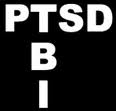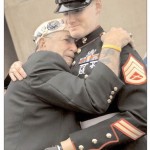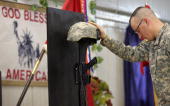Nov
6
When Humpty-Dumpty is Mom
Filed Under PTSD treatment, Today's War, Treating PTSD, Women in Combat | Comments Off on When Humpty-Dumpty is Mom
by Janet J. Seahorn

War is hell, and there is no polite way to put it.
But when modern war is fought by women as well as men, it can take an even more challenging toil on a family and community.
As Americans, we are quickly learning that our country and its military facilities are struggling to provide appropriate treatment for its female troops. There are many services for men; yet, we are not prepared to offer some of the same options for women.
This week I had two events occur from two different parts of the country. The first was a disturbing phone call from a friend, who has several family members serving in the military. All have fought in Iraq. Her son has been to both Iraq and Afghanistan on numerous tours of duty.
Her concern, however, was for her female family member. After serving in Iraq the military woman has been home for almost three years, taking care of two small children while working full time in a demanding job. The young mother had been exposed to a great deal while deployed, and has done her best to return to normal life stateside.
Most of the time things are fine, but a few weeks ago, the memories, anxieties, and panic attacks returned with a vengeance. As we have discussed numerous times in our blogs, the ghosts of combat often come back to take up residence in the homes of the military personnel.
Without hesitation, this bright lady and her family sought help through the VA. She has wisely enrolled in our local VA Clinic upon return from combat. This time, however, she would need more intense treatment.
Not a problem, except, that the only facility that could accommodate women only is in another state, making the decision to leave her family and work a great deal more difficult.
The second incident came via an article in the New York Times which was sent to me exactly two days after the first event. Reading over the article’s information was all too familiar. I had heard it just two days before. The article by Damien Cave stated, “Never before has this country seen so many women paralyzed by the psychological scars of combat.
As of June 2008, 19,084 female veterans of Iraq or Afghanistan had received diagnoses of mental disorders from the Department of Veteran Affairs, including 8,454 women with a diagnosis of post-traumatic stress — and this number does not include troops still active, or those who have never used the V.A. system” (Internet, Nov. 1, 2009).
The article continued to comment on what we have heard from many female vets, that because they are women, “people underestimate what these women have been through” (Resick, Internet, Nov. 1, 2009).
Since war has been traditionally fought by men, we have seen the Humpty-Dumpty effect. But what happens when Humpty is Mom? What happens when Mom is the wounded warrior? What happens to the children? What happens to the organizational system of the home: the washing, cooking, cleaning, and daily tasks?
Who steps up to help nurture the nurturer when she needs comfort, care, and support? These are vital questions that need to be explored and addressed.
When Humpty-Dumpty is Mom, she can be put back together; however, the tools and glue may be pink instead of blue.
Oct
20
PTSD Suffering & Control
Filed Under PTSD, Trauma, Treating PTSD | 1 Comment
By Janet J. Seahorn

This may be one of the most important blogs that I have written. Important because we are quickly becoming a people who, due to the recent attention on Post Traumatic Stress, are beginning to lump into the same basket all vets who return from conflict challenged by PTSD.
This is a major dilemma. It is vital that we as a nation, as communities, and as families start to have a more accurate description of the effects of combat trauma. Important because without correct information, we cannot help to mend the minds, hearts, and souls of those who suffer.
For that reason, solid facts through research on PTSD lead to better care. The problem, however, occurs when the media focuses only on those individuals who behave in extreme ways. Ways that make news casts, papers, and internet reading more exciting.
For the vast majority of veterans who return from combat tormented by the memories of war, the battle is within and remains there, silently distressing the individual.
But here is what is key to remember; the majority of vets are not personally or professional “out of control”. In fact, they spend a tremendous amount of time and energy trying to remain in control. For many, the periods of distress are when the person is alone, safe within the confines of house and home, or experiencing a severe physical or family crisis.
For most, the only people who see the anxiety and panic are not the outside world, but rather those within the vet’s inner-most circles: spouses, children, siblings, parents, and very close friends.
There are already many young (and some older vets) who are refusing to acknowledge they have a problem, or seek medical interventions even when they realize they need it. And why would they? Fearing they will be labeled and thrown into that “media basket” of dysfunction, they prefer to maintain a mask of silence. This isn’t acceptable, nor is it effective in mending the situation.
Yes, PTSD is a reality for many in our world, not just combat vets. For sure, it is a challenge like any “reordering” of the mind and body. Yet, most individuals move forward to live productive, successful lives. And if the individual gets appropriate medical and professional attention, that life and those who are closest to him/her, the living becomes immensely easier.
So let’s begin to write and tell stories of these quiet, courageous men and women. Stories of heroes and heroines who survive and manage to prosper in many areas of their lives; appreciating the fact that to be a hero requires an extraordinary act of bravery within an ordinary human spirit.
Sep
8
A New Beginning
Filed Under PTSD treatment, Treating PTSD | 1 Comment
-by Janet Seahorn

In a previous blog we wrote about the Wilderness and Healing. Before that we talked about how PTSD + Joy = Peace, Maybe — can move us toward wellbeing.
This week’s focus is a continuation of both ideas, an extension of how we can heal, can move forward and grow healthier. What every suffering person is searching for is a GENISUS – a new beginning, new start, a sort of rebirth.
So this is the big question, “what will be our new beginning after a trauma experience?” Trauma does not have to be the end of living, but a start of living life in a new way. It begins with the seeds we are now and grows into the people we want to become.
Imagine that person, vision it with all the bright pictures, melodies, and glory we can see, hear, and feel in our hearts. New beginnings ask us to examine what we learned from our combat/trauma experience, to go beyond the pain and terrible memories, and to rise above them.
To accomplish this mission will require that we put ourselves fully into the human arena. Isolation is not an option. We cannot lock ourselves away physically or emotionally; that means drugs, alcohol, over-working… are simply not possible choices.
The world is too rich, too interesting, too special to isolate ourselves. Yes, there are horrible things that occur. There is violence, greed, and cruel acts. And for every act of brutality, I believe there are many more acts of kindness, beauty, and love. We must not forget to notice these during our times of darkness. We must attempt to appreciate the goodness in the world. It is present. Just look.
An old saying states, “What we focus on persists”. What do we want to persist? We can focus on those things. Write them up. Put them on our refrigerators, nightstands, even our mirrors. The new us begins today. We choose. By no means will it be easy. The new us will not be perfect, but it will be real.
Like the Velveteen Rabbit, he became worn, torn, and aged only through the experience of being touched, loved, and used. And by going through all of his living, he became real. He developed into being alive, for being alive required a multitude of life events both magnificent and sad.
I am sure that if one were to inspect the experiences of the rabbit, he may have been diagnosed with PTSD. And, I am equally sure, that at the end of his days, he would not have traded these experiences for something easier and less physically or emotionally demanding.
He chose life, and so will we!
Aug
12
Wilderness and Healing PTSD
Filed Under Treating PTSD | 3 Comments
 They come at the most unexpected times; the demons, depression, sadness, anxiety… It is the uncertainty of the unwanted feelings, the never knowing for sure when or where they might appear that makes Post-traumatic Stress such a challenge to manage.
They come at the most unexpected times; the demons, depression, sadness, anxiety… It is the uncertainty of the unwanted feelings, the never knowing for sure when or where they might appear that makes Post-traumatic Stress such a challenge to manage.
Modern civilization, with all of its new technologies, now has more clever and massive means to torture and kill. And our conscious and unconscious psyche knows and understands this fact. So why in the heck would someone with PTSD feel secure and at ease in a large city, a crowded mall, or a traffic-filled highway?
Many times it is these modern places that exacerbate PTSD symptoms. Finding a place of safety to escape and heal may be to retreat to the wilderness. A place where Mother Nature opens her soft arms to surround us with peace, soothe our torn nerves, and comfort us with gurgling mountain streams, meadows splashed with abundant colors, greens so bright that they almost appear painted. Soft breezes and tiny birds sing a lullaby so sweet that we almost weep with gratitude. Compassionate, wilderness spirits seem to enfold our entire bodies and minds with their loving presence.
This summer we have been fortunate to spend a great deal of time in the mountains: camping, fishing, hiking, floating rivers. Each experience reinforced what we have always known – wilderness places heal.
There is a healing that takes place in the wilderness. Where hatred, greed, and meaningless violence cease to exist. When we are surrounded by wilderness our senses open up to drink in the sights, sounds, smells, tastes, and textures that quiet our minds, hearts, and tattered spirits.
Nature allows us to relax, to rejuvenate. It is why we are blessed to visit each special, wild place. We are privileged to experience natural environments and acknowledge the value of these common places becoming our sacred, healing grounds.
Please send us stories of your wilderness, healing places. We would enjoy hearing from you.
Aug
5
PTSD + JOY = PEACE… May be
Filed Under Treating PTSD | Comments Off on PTSD + JOY = PEACE… May be
 Some of you may have read the title to this blog and thought, “Oh right. You must be kidding!” Actually, I’m pretty serious about the components of the title: PTSD + Joy = Peace… May be.
Some of you may have read the title to this blog and thought, “Oh right. You must be kidding!” Actually, I’m pretty serious about the components of the title: PTSD + Joy = Peace… May be.
Putting these three words together – PTSD, Joy, and Peace – may be the only real solution to living life after trauma. It is what all of the therapists and therapies strive to achieve. Yet, I’m not sure that we think of them optimistically in the same sentence. However, the three are intricately linked by both the challenging and hallowed events of the trauma.
Despite the incredible agony and horror of the trauma, there is something that is definitely available to us if we quiet our minds and bodies enough to recognize some of the gifts the event may have brought us. Yep, I did say gifts. Gifts such as acknowledging the immense courage survival required. Gifts such as being deeply aware of the importance of each new day, each new experience, and life in its entirety. Gifts, that, in spite of the fear of recurring nightmares and panic attacks, you understand something about life and living that many do not.
You understand that it can be more fragile than you believed before the ordeal. You appreciate the fact that somehow, someway you survived. You recognize, after enduring profound sorrow, perhaps you made it through the fire because your mission on this earth was not done, and, you, in someway, were meant to carry on. It is not yours to question or know immediately what that mission is or may become. Only living each day fully can answer the question at the very end of our time.
So what does this have to do with Joy? In our society many think of joy and happiness as the same emotion. However, they are really quite different. Happiness may entail some outside, material component to subsist. Joy, on the other hand, can exist even during our darkest moments. This is possible because joy is connected to gratitude. Gratitude for what went before the trauma, what may come through it, and what can be after. You see, we now know what we know about the preciousness of life. We know the importance of the love of family and friends. The value of new life. The reminder of a rainbow after a storm.
As the joy/gratitude list grows, something amazing takes place in our hearts, minds, and bodies. We become peaceful. Maybe not all the time, or even, at first, much of the time, but some of the time. And that, my friend, is better than nothing. For if I can touch that peaceful place even once, I know it can be done. That gives me hope. Hope that I can touch it again, and again, and again.
Yes, PTSD + Joy = Peace… May be.
Apr
29
Angels Among Us
Filed Under Treating PTSD | 2 Comments
 It was almost night again. He got through one more day, but it’s the nights that we worry about. He gave us all of his guns, just to be safe; yet, we all silently understood that life could easily be disposed of in many ways. A life that seemed to have lost its joy, its hope, its sense of purpose. The year before he discovered he had prostate cancer. Surgery took care of future problems in that area. Shortly after that he lost his wife. Divorce can be devastating – feeling even more so than death, because your loved one is gone. Gone of her own free will, finally realizing that enough is enough. His sense of worth and caring is now at an all-time low. A few months later he came down with a serious case of West Nile virus. His body’s ravaged immune system made it impossible for him to work; he lost his job. Too much loss in so little time left his life tested by all the ghosts of the past – the ghosts from a place long ago, a place called Vietnam. The question ever present was how could he sustain the pain, grief, the disease? It was a question that kept all of us awake through the darkness. Something needed to be done to help him feel life was worth living. And this is when the miracle occurred. An angel appeared in the form of a soft, uncoordinated, four-legged, black Labrador who was given the earthly name, Wyatt. The small cherub gave unconditional love and joy. Now, when the lonely man woke in the night, the angel’s crazy antics made him laugh; something he hadn’t done in a very long time. The angel gave him a chance at a new beginning, a new existence beyond the solitude. This new place was called Hope.
It was almost night again. He got through one more day, but it’s the nights that we worry about. He gave us all of his guns, just to be safe; yet, we all silently understood that life could easily be disposed of in many ways. A life that seemed to have lost its joy, its hope, its sense of purpose. The year before he discovered he had prostate cancer. Surgery took care of future problems in that area. Shortly after that he lost his wife. Divorce can be devastating – feeling even more so than death, because your loved one is gone. Gone of her own free will, finally realizing that enough is enough. His sense of worth and caring is now at an all-time low. A few months later he came down with a serious case of West Nile virus. His body’s ravaged immune system made it impossible for him to work; he lost his job. Too much loss in so little time left his life tested by all the ghosts of the past – the ghosts from a place long ago, a place called Vietnam. The question ever present was how could he sustain the pain, grief, the disease? It was a question that kept all of us awake through the darkness. Something needed to be done to help him feel life was worth living. And this is when the miracle occurred. An angel appeared in the form of a soft, uncoordinated, four-legged, black Labrador who was given the earthly name, Wyatt. The small cherub gave unconditional love and joy. Now, when the lonely man woke in the night, the angel’s crazy antics made him laugh; something he hadn’t done in a very long time. The angel gave him a chance at a new beginning, a new existence beyond the solitude. This new place was called Hope.
Animals have a way of helping us through our trauma. Dogs, horses, cats… it really doesn’t matter just as long as the heart connection is made. The mental health professionals call it “animal therapy”. I call this, “Angels Among Us”.
(In our prior blog, one of our readers related his “angel” story as follows):
“For years and years I would constantly be told to “let go” or “forget about it” when it came to Vietnam. No one understood that I had relentlessly tried that, but it wouldn’t let go of me. For many years I managed to drink away many of the symptoms; unfortunately, that worked too well and I became addicted to my ‘medication’. I learned why that worked and was told by Dr Palmer that if he could prescribe any one medication that we both knew worked, it was alcohol, “but the side affects are a bitch” he said.
So, since 1996 I have been soberly searching for ways to handle the distress and disjointed aberrations of PTSD. As a result, I have found that immediate changes of venue, (physical location) and distraction help me to regain some steadiness. My second reliance is my dog, Babe, an Airedale that notices everything. She has awakened me during nightmares and licks me in the middle of the night if she detects something is not right with me. In exchange, I rely on her to know the safety of my surroundings. When she is calm there is no need for me to be alarmed.” (Mike MacDonald)
Angels calm our worst nightmares. They help us feel safer, saner – protected by a celestial, loving presence. We become braver because of their undying devotion. Yes, there are many angels among us, and they are called Chase, Bailey, Wyatt, Cody, and Babe…
Apr
26
Reflecting on a Comment
Filed Under Treating PTSD | 1 Comment
 Before I begin this blog I want to sincerely thank all of you who are following our book and providing feedback. I am well aware of the time it takes to stay aligned with a variety of online communication. It is humbling to know that individuals and families are finding our website helpful, and we are truly grateful for your comments.
Before I begin this blog I want to sincerely thank all of you who are following our book and providing feedback. I am well aware of the time it takes to stay aligned with a variety of online communication. It is humbling to know that individuals and families are finding our website helpful, and we are truly grateful for your comments.
Michelle Rosenthal, a reader of our April 15th blog, commented that she liked the last line:
“If we send them, then we must mend them.”
This has been our motto and theme throughout the book and certainly needs to be fully endorsed by our military, our country, our leaders, and our communities. What was thoughtful about Michelle’s comment was her last line where she asked, “How do we mend them in a way that does not inappropriately bend them?” And that, Michelle, is a billion dollar question – one for which I do not have a tangible response. Yet, I can say this, the solution lies in making a difference – one individual at a time. Healing does not fit every military experience or veteran the same. There are far too many variables. However, a few constants will be required: relentless determination to getting better, standing up and trying again even when staying down seems much easier, support from a variety of people (family, friends, the VA…), and most of all a deep feeling of being loved and worthy of love, when at times we feel quite alone.
For those of us living with someone suffering from PTSD, love does not mean accepting or condoning inappropriate behavior from either person. It means putting proper boundaries on our actions, without battering each other. It means that we love and trust each other enough to know that we can get better and want to get better. It means we believe the relationship is worth the effort, the pain, and frustration as long as there is progress toward emotional healing. And in the end, the mending will more than likely require a bit of bending. Perhaps it is only through the “bending” that genuine healing can take place. The key word in Michelle’s comment was “appropriate” bending. In a heavy wind a tree bends – that is a good thing. I’m simply trusting that the tree will sustain the storm because its roots are deep and firmly grounded in an earth that holds tightly to its foundation. Hopefully, if our spiritual and emotional roots are deep and far reaching, perhaps we can and will sustain the storm within. Nothing is impossible.
Apr
9
What I Know Now About PTSD
Filed Under Treating PTSD | Comments Off on What I Know Now About PTSD
 I thought some of you following our blog might like to read the few things I have learned in almost forty years of living with someone who has PTSD. The list is brief because I chose to focus on What I Know from years of experience, so here they are:
I thought some of you following our blog might like to read the few things I have learned in almost forty years of living with someone who has PTSD. The list is brief because I chose to focus on What I Know from years of experience, so here they are:
PTSD is an invisible ghost that appears in one’s emotional life at the most unexpected times.
- It is almost impossible to identify all of the triggers – i.e., things that remind the senses: sight, sound, touch, taste, and smell of the past trauma.
- PTSD is the second war the individual must fight once home and it is sometimes even more challenging to succeed.
- This second war can be as hideous as the first. It is often manifested in common places and homes of the veteran. It affects the entire family – parents, siblings, spouses, children….
- PTSD is like throwing a huge rock in the middle of a quiet pond. The ripples extend far beyond the rock’s impact. In many cases the displacement seems to suck everything in its path into a black hole where normal life disappears entirely.
- Ignoring PTSD symptoms does not make them go away. They continue to fester.
- And most hopeful, PTSD can be managed. It can be effectively controlled, but only if the person affected admits there is a problem. As with most problems, awareness is the first step to healing. Taking steps to get the appropriate help, taking the responsibility for the situation, and doing something to heal is absolutely the best, and sometimes the only viable way to move through the life journey with better emotional and physical health.
- One last comment to employers — A person who has fought in combat and served his/her country honorable will definitely serve your organization/company in equal fashion. He/she will be committed to the work and fellow workers. He will be focused on the task at hand and will be relentless in making sure that the job is done well. She will pay attention to the details as well as the big picture. He will be a dependable asset to your organization. And most of all, she deserves the opportunity to have a normal, prosperous, and stable life after what she gave to our country and to us.
Mike MacDonald of the Black Lions CO C 2/28, ’68-69’responded to this recent blog and I thought it was worth adding:
“Demonstrated Team Player” – I run a small company and there are certain things I automatically know about Vets. They can be as disciplined as they need be, are team players, accept direction, are usually task oriented and conscientious.” Thanks, Mike for your comments.
Mar
6
Healing Takes Courage
Filed Under Treating PTSD | Comments Off on Healing Takes Courage
 Its been almost two weeks since I last wrote a blog. We had to cancel Tony’s last EMDR session and reschedule for Monday, March 2nd. He is struggling trying to understand exactly what EMDR is supposed to do for him. He wants to analyze everything in concrete terms. That would be fine if PTSD were a concrete, cogntive issue. It is not. Trauma doesn’t first happen in the brain/mind. It happens in the sense cells of the body. These sense cells then rely the information to the brain for interpretation, and the brain determines if the stimulus from the cells is worthy of response ranging from being safe to a dangerous situation that would require the body to fight, flee, or just freeze from fear.
Its been almost two weeks since I last wrote a blog. We had to cancel Tony’s last EMDR session and reschedule for Monday, March 2nd. He is struggling trying to understand exactly what EMDR is supposed to do for him. He wants to analyze everything in concrete terms. That would be fine if PTSD were a concrete, cogntive issue. It is not. Trauma doesn’t first happen in the brain/mind. It happens in the sense cells of the body. These sense cells then rely the information to the brain for interpretation, and the brain determines if the stimulus from the cells is worthy of response ranging from being safe to a dangerous situation that would require the body to fight, flee, or just freeze from fear.
At the beginning of the session, Shelly, Tony’s therapist, takes him back to the first few days of being in Vietnam. When a military person is told where his/her assignment will be, there is no discussion. No bargaining saying, hey, I don’t want to go to that place because that is where most of the fighting and deaths occur. You can’t stand up and yell, “Hell no, I won’t go!” You are slowly being pushed into the decision that has been made for you by a stranger. You come to an acceptance of the situation – a realization that what is… is. Mission first. The job now is to stuff the feelings… fear, excitement, apprenhension. Shelly keeps gentle urging Tony to focus on the feelings. She is trying to getting his body to process the gaps between the mind and the body. I must say, that watching this session made me understand how much easier it is to stay in the head instead of the feeling in the body. The pain is real. Why would anyone want to go back to hell — except that only by going back will the body heal and the mind mend.
I am still being surprised at what I thought I knew but didn’t and what I never even considered as a potential problem. Yes, the whole experience of war gets dumped into the same memory box, wrapped up tightly and sealed away somewhere in the mind and body. Holy Smokes, healing combat trauma is like having to undergo an emotional chemo to survive. Just as chemo changes the cells of the body to fight against cancer cells, therapy to heal PTSD changes the cells in the mind/brain to recreate the sense cells of the body to heal from the damage of trauma.
Feb
23
PTSD: Community and Family Scars
Filed Under Treating PTSD | Comments Off on PTSD: Community and Family Scars
Last Thursday, Tony and I appeared on KGAB radio in Cheyenne, WY, followed by a book signing at a local book store. Our host, Dave Chaffin was a kind and thoughtful interviewer, much like Lorin and Dixie Ricker in Castle Rock. The broadcast was pretty typical for a book interview. That is, until listeners began calling into the station. We were talking about how a soldier’s neuro-network had been altered to react to combat threats and danger, and who when the individual returns home, his/her brain is still configured for combat and threat. For example, driving hazards are commonplace to everyday Americans. Road rage, stop & go traffic, debris alongside the roadway are all common occurrences. The combat veteran, however, can experience many of these things as a potential threat. A threat that can have a life and death consequence. An elderly lady phoned to tell of us of an experience she had while driving in downtown Cheyenne. She explained that while approaching a street light she had to stop quickly to avoid running the red light. The car behind her immediately whipped into the adjoining lane and the driver got out of his car, angrily walking toward her. She noticed he was wearing military fatigues. His face and demeanor were quite frightening to her, so she picked up her cell phone to call the police. Upon seeing this, the soldier turned and went back to his truck and left. The lady got his license plate and relayed the information to the police who contacted his commanders. What they discovered was this: The soldier had recently returned from Iraq and was having some severe adjustment problems. They asked the woman if she wanted to press charges, but she kindly declined. By no means does serving in combat excuse a person from inappropriate behavior, yet, it does show that combat PTSD can and will affect more than just the veteran and his/her family. It can impact the entire community in various ways, some that can be very negative. So the real message again is: “IF WE SEND THEM, THEN WE MUST MEND THEM”. For every one’s sake!
Another story: While at the book signing, we meet a young man in his early thirties. Initially, he wasn’t at all interested in purchasing our book, but he was intrigued by the title. When he sat down to chat, he began telling his story. He spoke of a stepfather who served in Vietnam and was incredibly cold, irritable, aggressive and cruel. Actually, he didn’t have a kind word to say. When we told him about the effects of combat and PTSD, he bought the book. His reason: Perhaps, he said, if he understood better what was going on with his step-dad, he might just be able to forgive him and lessen his own anger and hatred. The tragedy of this young man’s story is the fact it will be repeated over and over again unless, as a country, a community, and a family, we begin to build a greater awareness of how challenging trauma is to the well-being and health of everyone. PTSD is not a condition we can afford to disregard. The consequences will be too enormous and the costs, both economically and morally, too high!


